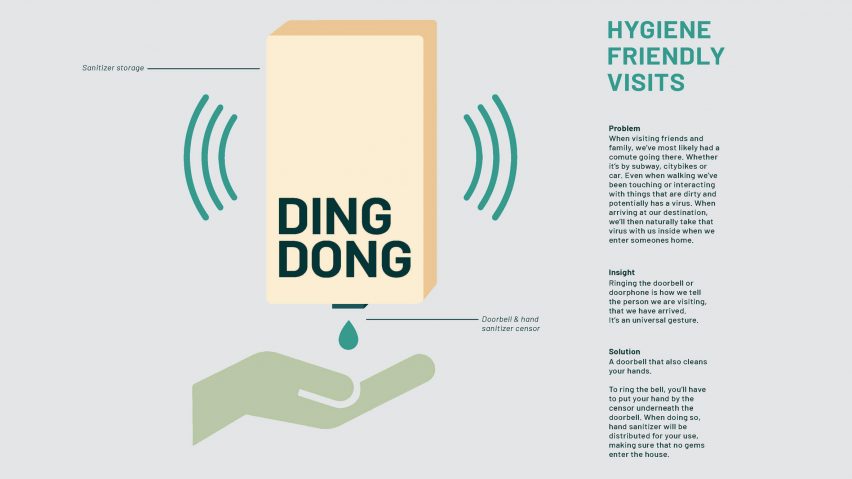
Sanitising bubbles and seaweed capsules among winners of Bompas & Parr hygiene contest
A machine that blows sanitising bubbles, single-dose seaweed capsules and a disinfecting doorbell are among winners of Bompas & Parr's Fountain Of Hygiene competition, which called for ways of rethinking hand-washing for the coronavirus era.
Other winning entries include a tabletop phone sanitiser and a public dispenser made from recycled plastic.
Bompas & Parr, an experience design studio based in London, put out a call in March for designers to re-think the way that hand sanitising could be normalised in light of the pandemic.
Frequent hand washing has become the first line of defence against spreading the virus, so the competition was set up to invite new methods and rituals for people to easily sanitise their hands.
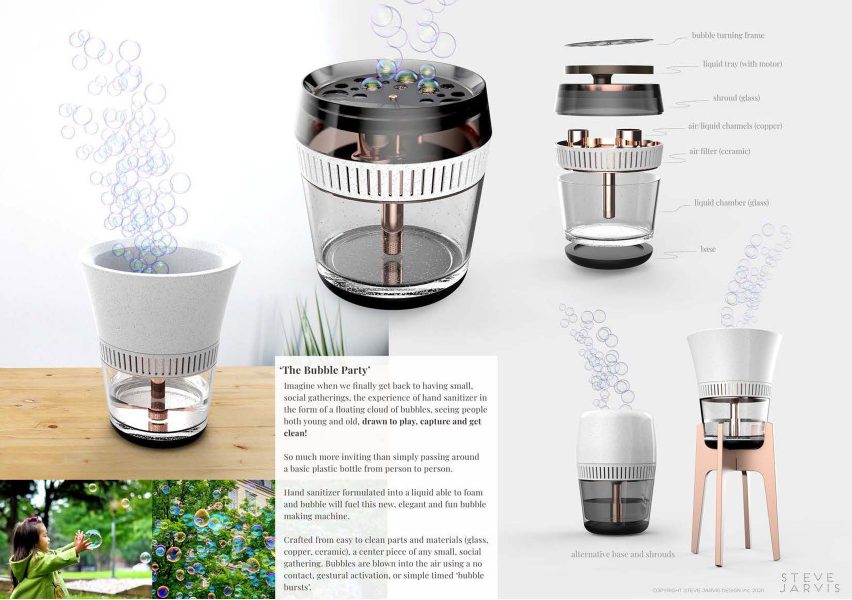
Steve Jarvis, founder of Steve Jarvis Design, won the Industrial Design category with his concept The Bubble Party. Jarvis re-imagined the popular party prop of the bubble machine as a fun hand-cleansing activity.
A specialised machine lined with copper, known for its anti-viral properties, would blow out bubbles of hand sanitiser for people to play with and pop.
Line Johnsen won the Gesture and Ritual category with her design Hygiene Friendly Visits – a touch-free doorbell that dispenses sanitiser as the user puts their hands underneath to activate it.
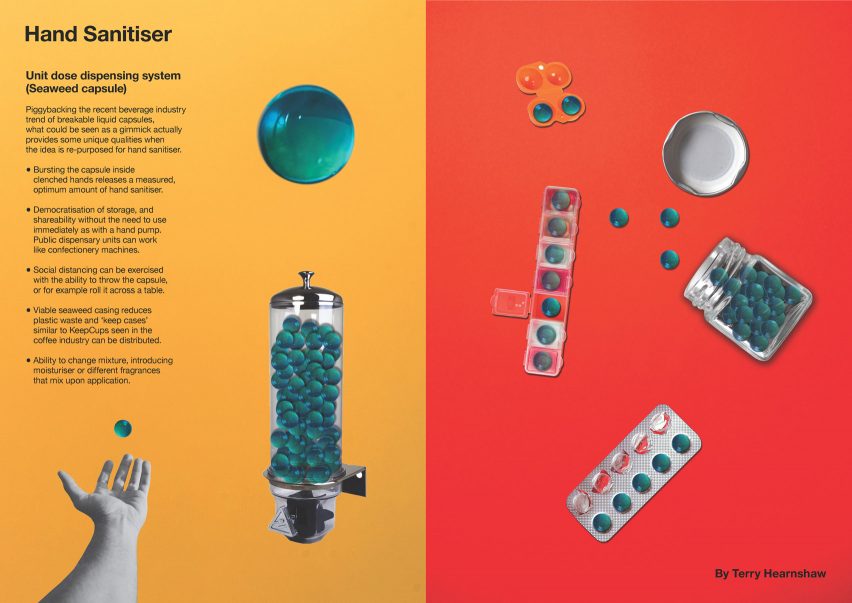
Terry Hearnshaw's concept Seaweed Capsules won the Sustainable Design category. Hearnshaw, who is a graphic designer for Nissen Richards, came up with the idea of putting one hit of hand sanitiser in a capsule that could be put in a gumball machine or portable blister packs.
Edible capsules made from algae have already been trialled as a sustainable alternative to plastic bottles.
"The design was stylish and I could imagine that these could really help in those situations where it feels socially awkward or embarrassing to be carrying a whole bottle of sanitiser," said the food journalist and author Bee Wilson.
"I loved the idea of sanitiser becoming something shareable, almost like chewing gum."
Wilson was on the Fountain Of Hygiene competition jury, along with London & Partners managing director Jules Chappell, Founder and Editor-in-Chief of Dezeen Marcus Fairs, Design Museum director Tim Marlow, experimental psychologist Charles Spence, Bicardi's global director of innovation at Deb Pellen, and Bompas & Parr co-founder Harry Parr.
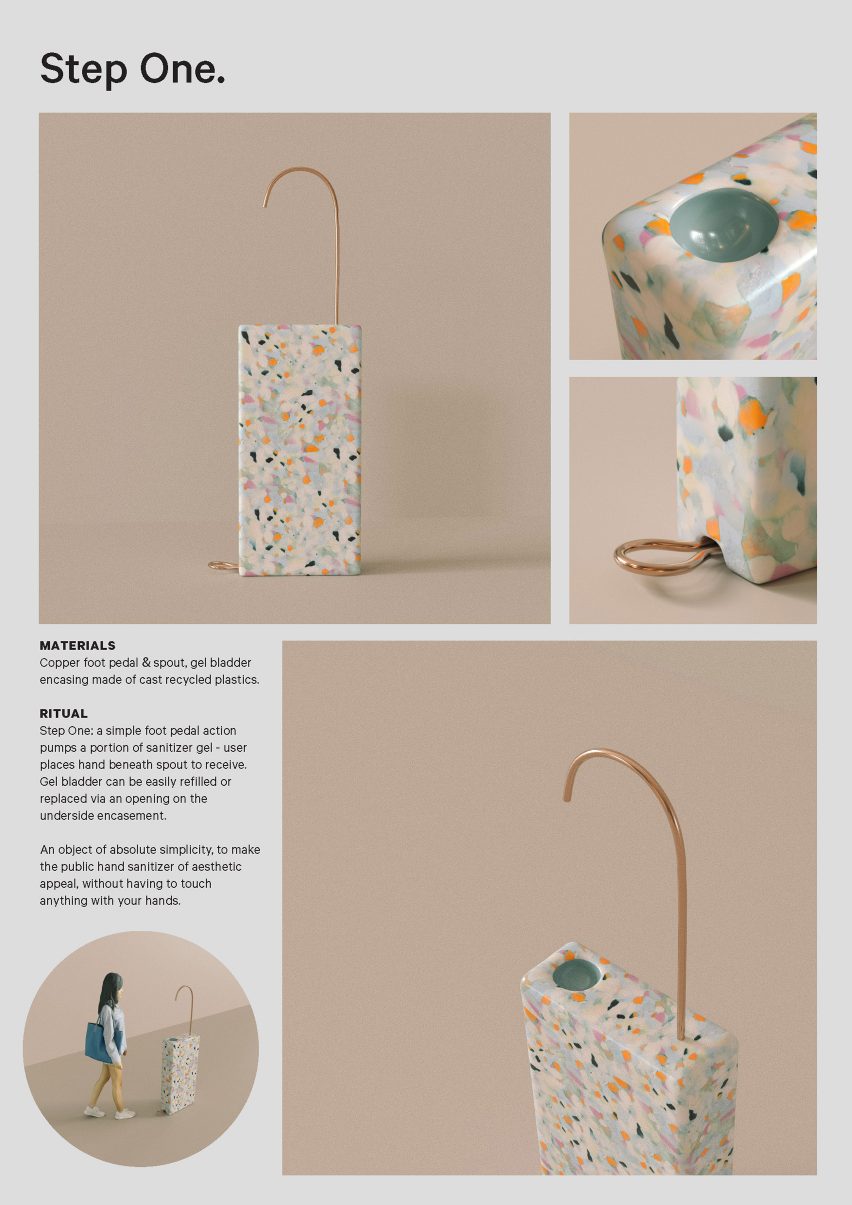
The Luxury Design category was won by New York-based designer Sally Reynolds. Called Step One, Reynolds designed a pedal-activated freestanding dispenser unit.
Designed to be as aesthetically appealing as possible to attract users, the base would be made of recycled plastic melded in a terrazzo effect, with a trendy (and hygienic) copper spout and pedal. A replaceable bladder of sanitising gel would be stowed inside Step One.
Winners of the Child-Directed Design category were Kate Strudwick, Amos Oyedeji, Alexander Facey and Nicole Stjernswärd. Paint Your Hands Clean! is a playful bottle of hand sanitiser topped with a brush applicator.
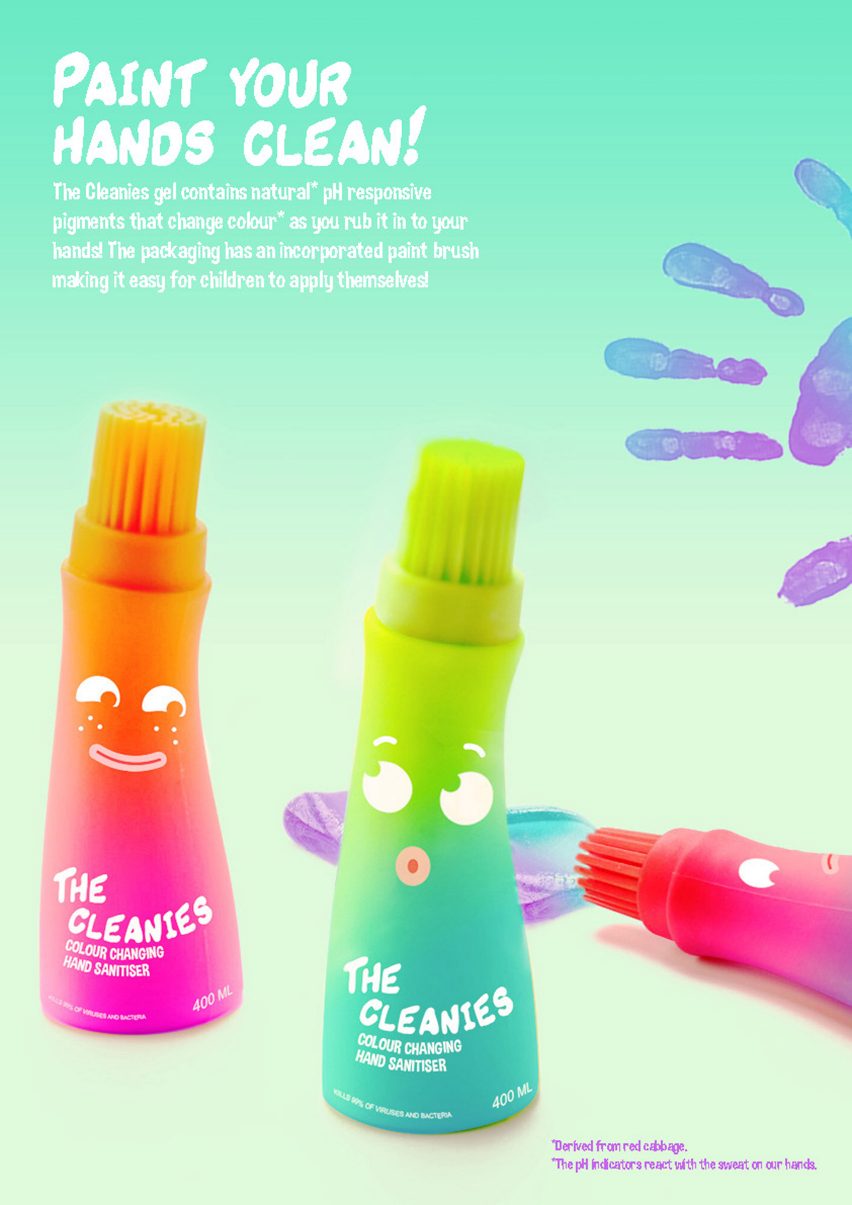
Children could apply it over their hands like a paintbrush, and pH-responsive pigment made from red cabbage would change colour as they rub it in.
Bo Willis won the Cadet Designer category for entries by an adult on behalf on someone under 18. Called Handle Sanitiser, Willis suggested making sponge covers for door handles that would be pumped full of hand sanitiser.
As people open the door they'd get one hand covered in sanitiser, which they would then be able to rub onto the other hand.
"I found this deceptively simple idea absolutely inspired," said Wilson. "This was an idea that I can see making a real social impact if it could be adopted in offices or schools."
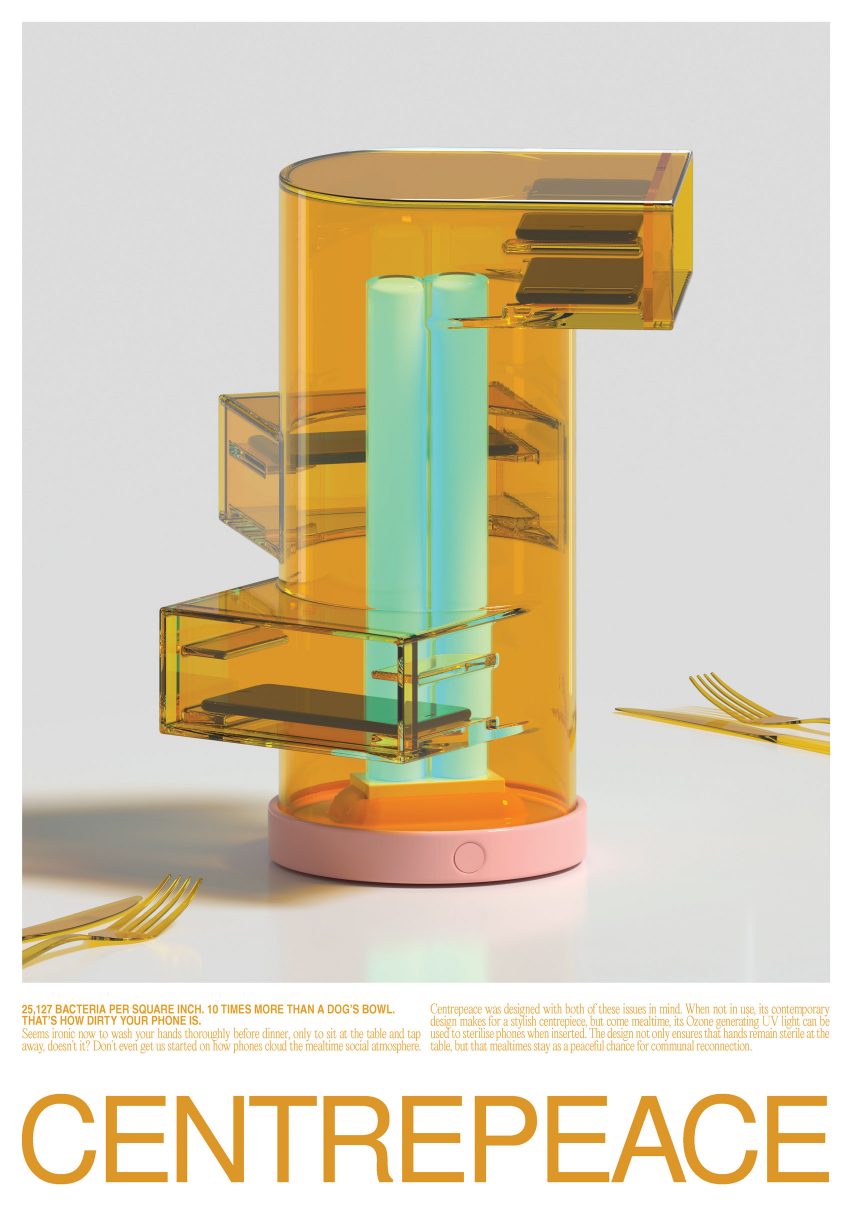
The winner of the category Hygiene Innovation Beyond the Sanitiser was Conrad Haddaway, Twomuch Studio and Inga Ziemele with their concept for a mobile phone sterilisation unit.
Called Centrepeace, the funky tabletop stand would be placed on a dining table to encourage people to put their phones away inside it. Centrepeace would sterilise the phones with UV light, and encourage diners to chat with each other rather than play on their devices.
"This idea captured not only the importance of regularly cleaning our phones but also, for me, one of the most positive things to have come out of the lockdown, which is meals together as a family," said London and Partners managing director Jules Chappell.
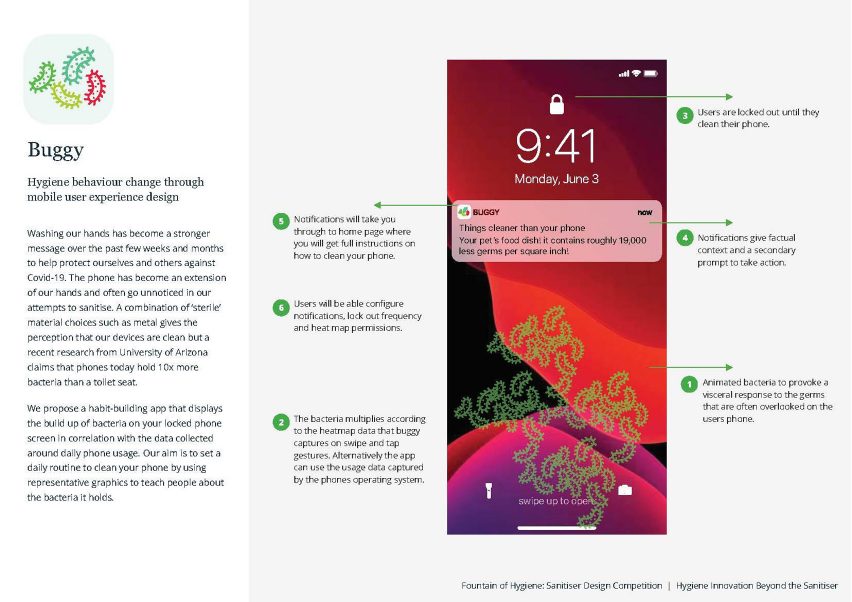
Zoe Lester, Beth Thomas, Emma Chih, Erin Giles and Kris Murphy won the Awareness and Communication category with their app Buggy. Once downloaded, the app would prompt regular pop-up notifications reminding people to wash their hands. Animated bacteria would crawl across the screen to provoke a visceral response.
"Built on surprising and solid science, this solution could really help address a major source of infection," said experimental psychologist Charles Spence.
"The visuals were also humorous and engaging. Seems an easily scalable solution too, hence potential for widespread impact."
All these winning designs will be displayed online here until the Design Museum re-opens and a physical exhibition can be put on. Entrants were invited to donate to the British Red Cross, and the prototypes will be auctioned at Christie's to raise more money for the charity. The People's Choice Award is still open for you to cast your vote.